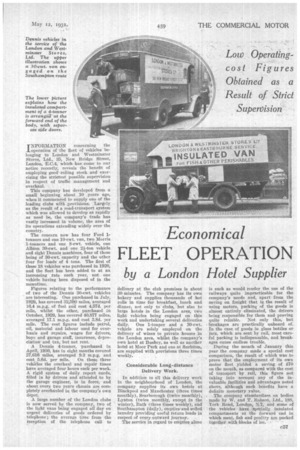Economical
Page 127

If you've noticed an error in this article please click here to report it so we can fix it.
FLEET OPERATION
by a London Hotel Supplier
TNFORMATION concerning the loperation of the fleet of vehicles belonging to London and Westminster Stores, Ltd., 35, New Bridge Street, London, E.C.4, which has come to our notice recently, reveals the benefit of employing good rolling stock and exercising the strictest possible supervision in respect of traffic management and overhaul. .
This compauy has developed from a small beginning about 10 years ago, when it commenced to supply one of the leading clubs with provision& Largely as the result of a road-transport system Which was allowed to develop as rapidly as need be, the company's trade has vastly increased in volume, the area of its operations extending widely over the country.
The concern now has four Ford 1tottners and one 10-cwt. van, two Morris 1-tanners and -one 8-cwt. vehicle, one Albion 30-cwt. and one 2i-ton vehicle and eight Dennis machines, four of these being of 30-cwt. capacity and the other four for loads of 4 tons. The first of these 18 vehicles was purchased in 1920, and the fleet has been added to at an increasing rate each year, not one vehicle having been disposed of in the meantime.
.Figures relating to the performance of two of the Dennis 30-cwt. vehicles are interesting. One purchased in July, 1929, has covered 22,59,0 miles, averaged 16.4 m.p.g. of fuel and cost 4.57d. per mile, whilst the other, purchased in October, 1929, has covered 40,877 miles, averaged 17.1 m.p.g. and cost 3.8d. per mile. The cost figures include petrol, oil, material and labour used for overhauls and repairs, wages for drivers, bop; and garage star, insurance, depreciation and tax, but not rent.
A Dennis 4-tonner, purchased in April, 1930, has in eight months covered 27,616 Miles, averaged 9.3 m.p.g. and cost 5.6d. per mile. On these three vehicles the overhaul and repair times have averaged four hours each per week.
rigid system of daily report cards, filled in by drivers and attended to by the garage engineer, is in force, and about every two years chassis are come pletely overhauled in the company's own depot.
A large number of the London clubs is now served by the company, two of the light vans being engaged all day on urgent deliveries of goods ordered by telephone; the average time from the reception of the telephone call to delivery at the club premises is about 36 minutes. The company has its own bakery and supplies thousands of hot rolls in time for breakfast, lunch and dinner, not only to clubs, but also to large hotels in the London area, two light vehicles being engaged on this work and undertaking several deliveries daily. One 1-tonper and a 30-cwt. vehicle are solely employed on the delivery of wines to private houses in the London area, whilst the company's own hotel at Bushey, as well as another hotel at Moor Park and one at Surhiton, are supplied with provisions three times weekly.
Considerable Long-distance Delivery Work.
In addition to all this delivery work in the neighbourhood of London, the company supplieS its own hotels at Blackpool and Manchester (three times monthly), Scarborough (twice monthly), Lynton (twice monthly, except in the winter), Bath (three times weekly); and Southampton (daily), empties:and soiled laundry providing useful return loads in respect of every outward journey.,
The service in regard to mai-dies alone
is such as would render the use of the railways quite impracticable for the company's needs and, apart from the saving on freight that is the result of using motors, packing of the goods is almost entirely eliminated, the drivers being responsible for them and proving quite reliable. Not only this, but • breakages are practically unheard of. In the case of goods in glass bottles or • jars, which are sent by rail, most careful packing is indispensable, and breakages cause endless trouble.
. During the month of January this year the company made a special cost comparison, the result of which was to prove that the employment of its own motor fleet yielded a saving of £70 on the month, as compared with the cost of transport by rail, this figure not taking into account any of the invaluable facilities and advantages noted above, although such benefits have a definite monetary value.
The company standardizes on bodies made by W. and T. Robson, Ltd., 188, York Road, 'London, :g.7;. and came of the vehicles •have apecially insulated compartments at the forward end in which meat, fish and poultry are packed .together.with blocks of ice. •




































































































































































































